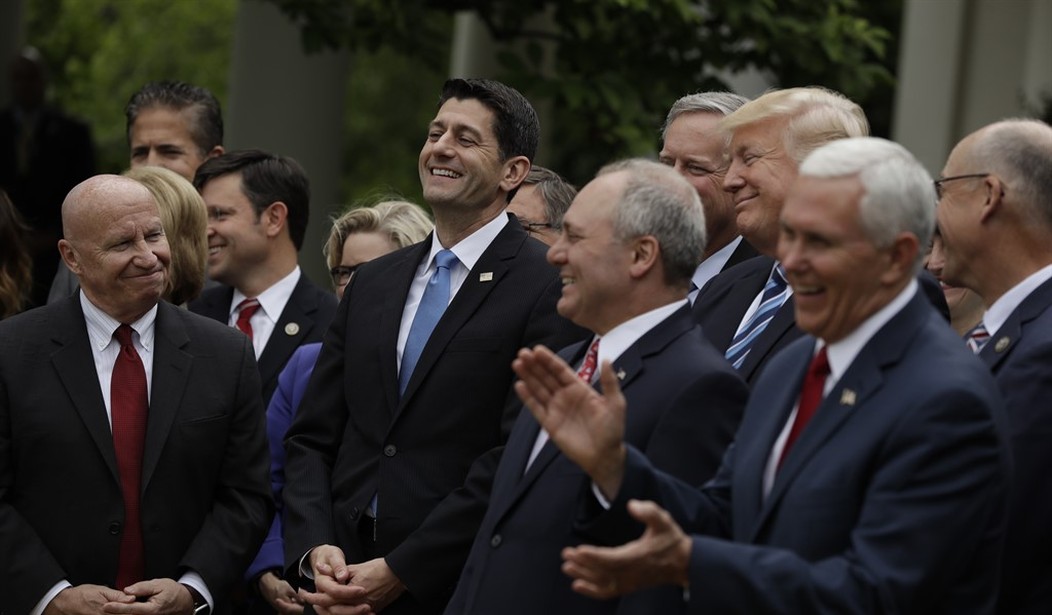The version of the AHCA that failed in late March was so unpopular that not even half of Republicans at the time told YouGov that they supported. The split went 45/31 — again, among Trump’s and Ryan’s own party. Among the wider public, it was, er, 21/52, in line with that gruesome Quinnipiac poll that had the bill at a sparkling favorable rating of 17 percent. Today, though? The GOP now supports the new and improved AHCA 75/9, a 30-point surge no doubt driven in part by that back-slapping Rose Garden celebration on Thursday afternoon. It was goofy on the merits to hold a ceremony for a bill that’s done nothing more yet than barely clear the House, but it was smart politics. A show of unity among Republican leaders has helped unify the party’s base, more or less.
That’s the good news. The bad news: Although the bill is no longer as unpopular as hot garbage, it’s still about as unpopular as lukewarm garbage.
Thirty-one percent of Americans favor the American Health Care Act, which narrowly passed the Republican-controlled House last Thursday. Forty-four percent oppose the bill, which would repeal much of the current health care law. Another 25 percent are unsure.
As was the case during the GOP’s failed attempt to pass the bill in March, Americans are more likely to be intensely opposed than even modestly supportive. Just 8 percent say they favor the bill strongly, with 34 percent strongly opposed.
Americans say, 39 percent to 26 percent, that the AHCA would likely be worse, not better, than the current health care law. Just 14 percent believe the AHCA would make things better for them personally, while 27 percent say it would make things worse.
The bill’s up ten points overall thanks to the GOP surge in support but is still pulling a feeble 31 percent among Americans generally. No matter how much better this bill gets in the Senate, though, it’s fated to poll badly because Democrats are uniformly opposed to anything that might replace ObamaCare. It’s not just a policy thing. They’ve invested immense political capital in passing and protecting the law over the past seven years; they lost their House majority because of it and, as recently as this weekend, Barack Obama himself declared publicly that it was worth it. Nothing short of single-payer will challenge the Democratic unanimity that O-Care is superior to anything and everything the GOP might cook up. (In late March, Dems were split 4/83 on the AHCA. As of Friday, they were split 3/89.) That being so, the only way the bill will approach anything like an even split nationally is if Republicans line up behind it just as uniformly. And given the complexities of health-care policy, that’s unlikely to happen: There will be Medicaid cuts of some sort, which some downscale GOP voters won’t like, there will be less robust subsidies than under ObamaCare, which some older working-class Republicans won’t like, and so on. Here’s how this looks when you ask people if the AHCA will be better in practice than ObamaCare:

The Republican reply: “Damn right! Although … let me take a minute to compare this to my current plan.” The Democratic reply: “HELL NO. OBAMA’S LEGACY.” You’re going to have net-negative polling when you’ve got a dynamic like that. Although hopefully not so net-negative that you’re topping out at 31 percent support overall. Yeesh.
The scoop of the day, by the way, may belong to HuffPo, which reports that House Freedom Caucus chair Mark Meadows has been huddling with Senate Republicans on their own bill. The idea, of course, is to help the Senate produce a bill that’ll be more acceptable to House conservatives right off the bat; get Meadows’s buy-in early and some of the Freedom Caucus will come along, raising the odds of eventual passage. Many a lefty on Twitter has been freaked out by the story since they’ve been counting on the House and Senate ending up in a stalemate. What sort of changes to the House bill might Meadows tolerate? He says he knows the cuts to Medicaid will be less dramatic in the Senate bill and that subsidies for seniors are likely to be increased at the expense of subsidies for younger adults. Both of those changes should make the bill more salable to the public. As for the waivers that’ll let states opt out of key ObamaCare regs, Meadows imagines an amendment that would bring that down to the insurer level — i.e. insurers would be allowed to offer some plans that don’t comply with ObamaCare’s rules so long as they also offer a number that do. (Whether the latter will be deliberately too expensive to attract consumers is an open question.) The details are up in the air, obviously. Meadows’s hope of getting something through Congress, and of preventing the Senate bill from being a total sellout to moderates, is more firm. That’s what has liberals scared.
Via the Free Beacon, here’s Democrats reacting to our current national debate with their usual aplomb and perspective.







Join the conversation as a VIP Member